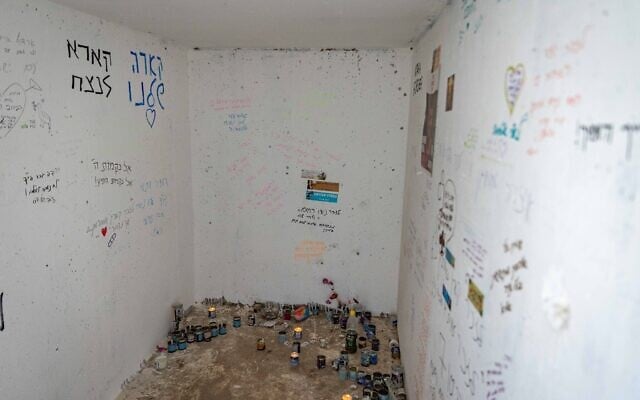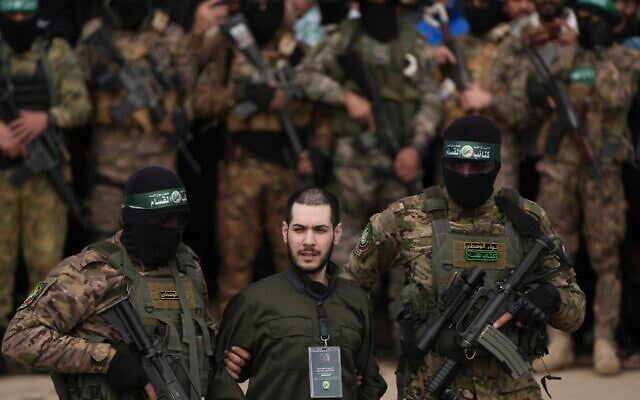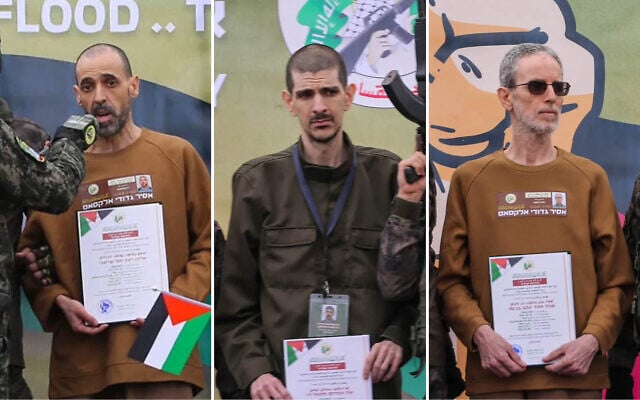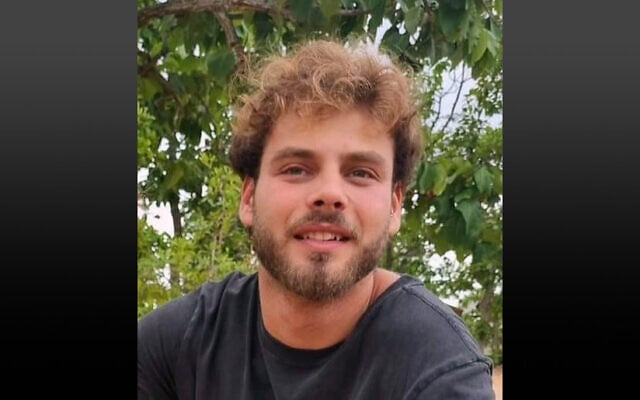


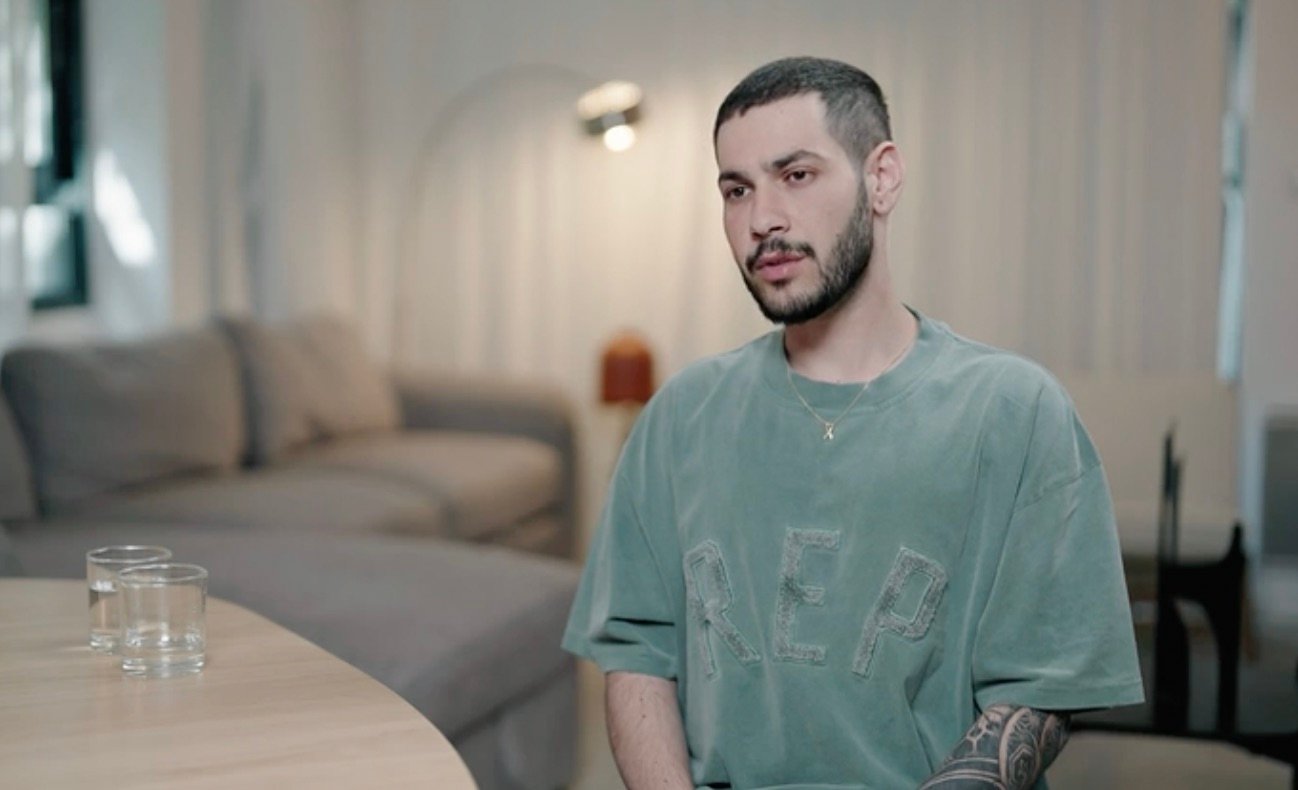
Former hostage Eliya Cohen, who was abducted from the Nova music festival and held captive for 505 days, said in an interview aired Tuesday that Hamas-led terrorists killed another captive who tried to escape as they were being taken to Gaza on October 7, 2023.
Speaking with Channel 12 news, Cohen also described the difficult conditions in captivity, saying that his captors drastically increased the amount of food he was given during his last weeks in the Gaza Strip after the gaunt appearance of hostages released before him sparked international outrage.
Cohen was held captive with Eli Sharabi and Or Levy, who were returned to Israel on February 8, dangerously emaciated. The three were also held together with Alon Ohel, who has yet to be released.
According to Cohen, he first encountered Ohel during the October 7 attack after fleeing the desert rave together with his fiance Ziv to a roadside bomb shelter, later dubbed the “bunker of death” after terrorists attacked it by hurling grenades inside at partygoers.
“They threw the first grenade. Someone shouted, ‘grenade! Grenade!’ I jumped on Ziv… and the first thing that came out of my mouth was: ‘Ziv, I love you.’ The grenade exploded and killed everyone at the entrance. Ziv replied to me, ‘Eliya, I love you.'”
Cohen said that off-duty Staff Sgt. Aner Shapiro then got up and told the group, “We cannot let them kill us like this,” before grabbing the next grenade tossed into the shelter and throwing it back outside.
Meanwhile, police answered Ohel’s 911 call.
“He [Ohel] told her, ‘listen, we’re in a bomb shelter. They’re throwing grenades at us. They’re shooting at us.’ Her response was: ‘Hide, okay bye.'”
Cohen then recounted seeing Shapiro get shot while holding another grenade to throw back. “He fell on the ground and the grenade exploded with him. At this point I said to myself, ‘I don’t believe it.’ The guy who was guarding us is gone.”
Other people in the shelter then began throwing grenades back, though one detonated and blew off the harm of Hersh Goldberg-Polin. “After that no one got up to throw more grenades,” said Cohen.
As he and Ziv — who was not ultimately kidnapped — hid from the terrorists under bodies, Cohen said she told him, “‘well, at least above we’ll be together. There no one can bother us.'” Cohen was then shot in the leg. “I think that at this stage I was already losing consciousness and can’t remember anything until 11 in the morning.”
He said his next memory was opening his eyes to three terrorists filming him after seizing him from the bunker, where they also abducted Ohel, Levy and Goldberg-Polin, the latter of whom who was murdered in Gaza last year.
“[One of the terrorist’s] had an insane smile on his face. A crazy smile. I will never forget that smile in my life,” said Cohen. “I go to sleep with this smile, I live with it. It’s the smile of my kidnapping.”
They were then put on trucks to be taken to Gaza.
“[The terrorists] were rejoicing like they had won. They were hammering us with blows, [rifle] butts to the head, stomping on us and spitting on us,” Cohen said.
He said at this stage, another captive in the truck who he did not identify decided to make a run for it.
“He decided to take the situation into his hands and said, ‘I’m jumping.’ We told him, ‘Don’t do it,’ but while riding he did. They stopped the truck and shot him to death. We kept going as if nothing happened, as if a guy hadn’t jumped and been shot,” said Cohen.
After arriving in Gaza, Cohen said he was brought to an apartment where Levy and Ohel were also held, before being taken to an underground tunnel. There, Cohen was put in chains that his captors would only remove every two months or so when he washed.
The most difficult hardship however was the lack off food, which Cohen said he received very little of the majority of his time in captivity.
“You can deal with being humiliated, you can deal with being cursed at, you can deal with your legs being in chains,” he said. “Hunger is a daily struggle because, beyond being hungry, you are also fighting for your life. Every night, you go to sleep thinking, ‘what am I going to do tomorrow to get that piece of pita bread?'”
He said that most days, their captors would give each of the four men a piece of pita, and one or two spoonfuls of beans or peas, but on other days, “I would beg God for that to be the case. For it to be a dry pita with two spoons of beans.”
He said sometimes the terrorists would bring them three pitas instead of four, and ordered the men to share, claiming they would give them another one later in the day.
“You find yourself begging — and they enjoy it,” he said. “They know they are starving you.”
Cohen said that occasionally, he and the other hostages would try and make a personal appeal for their captors to provide them with more food, and were successful.
“I can’t describe that feeling when you suddenly manage to pull on his heartstrings and they quietly enter the room and bring you some pita, or chocolate bar or peanut butter bar,” he recalled. “It’s the best thing that has ever happened to you in your life at that moment, because you survived another day.”
Although he had no access to the outside world for the duration of his captivity, Cohen said he realized that a ceasefire deal must have been signed when, in late January, his captors started appearing “very, very happy.”
“Suddenly more food started coming in,” he said. “A month before we went home, a [Hamas] commander arrived. He saw us in terrible condition and ordered us to be unchained because essentially, ‘the fighting is over.'”
He said that their terrorist captors started “stuffing us with a lot of food, in particular after Eli and Or were released. It made a stir.”
Despite having been severely malnourished up until that point, Cohen said he didn’t struggle to adjust to the larger quantities of food.
“You are so insecure from the lack of certainty of nutrition and food that you want to put anything in your mouth,” he said.
During the interview, Cohen also described his painful departure from Ohel before he was freed from Gaza in February during the first phase of the since-collapsed hostage release and ceasefire deal.
“Alon went into panic. He was really terrified and started crying,” said Cohen, adding he told Ohel “everything was okay” as he too would be released in several days. “I really, really believed that the second stage would arrive quickly.”
“We embraced and cried, I told him to be strong. I promised him that though I’m going up [from the tunnel], that doesn’t mean I’m forgetting about him.”
“I promised him, Alon, that I’m leaving here and until I meet you again in Israel, it’s not over. This is also why I’m here,” said Cohen.
Including Ohel, terror groups in the Gaza Strip are holding 59 hostages, 58 of them among the 251 abducted by Hamas-led terrorists on October 7, 2023. They include the bodies of at least 35 confirmed dead by the IDF.
Hamas released 30 hostages — 20 Israeli civilians, five soldiers, and five Thai nationals — and the bodies of eight slain Israeli captives during a ceasefire between January and March. The terror group freed 105 civilians during a weeklong truce in late November 2023, and four hostages were released before that in the early weeks of the war. In exchange, Israel has freed some 2,000 jailed Palestinian terrorists, security prisoners, and Gazan terror suspects detained during the war.
Eight hostages have been rescued from captivity by troops alive, and the bodies of 41 have also been recovered, including three mistakenly killed by the Israeli military as they tried to escape their captors, and the body of a soldier who was killed in 2014.
The body of another soldier killed in 2014, Lt. Hadar Goldin, is still being held by Hamas, and is counted among the 59 hostages.

